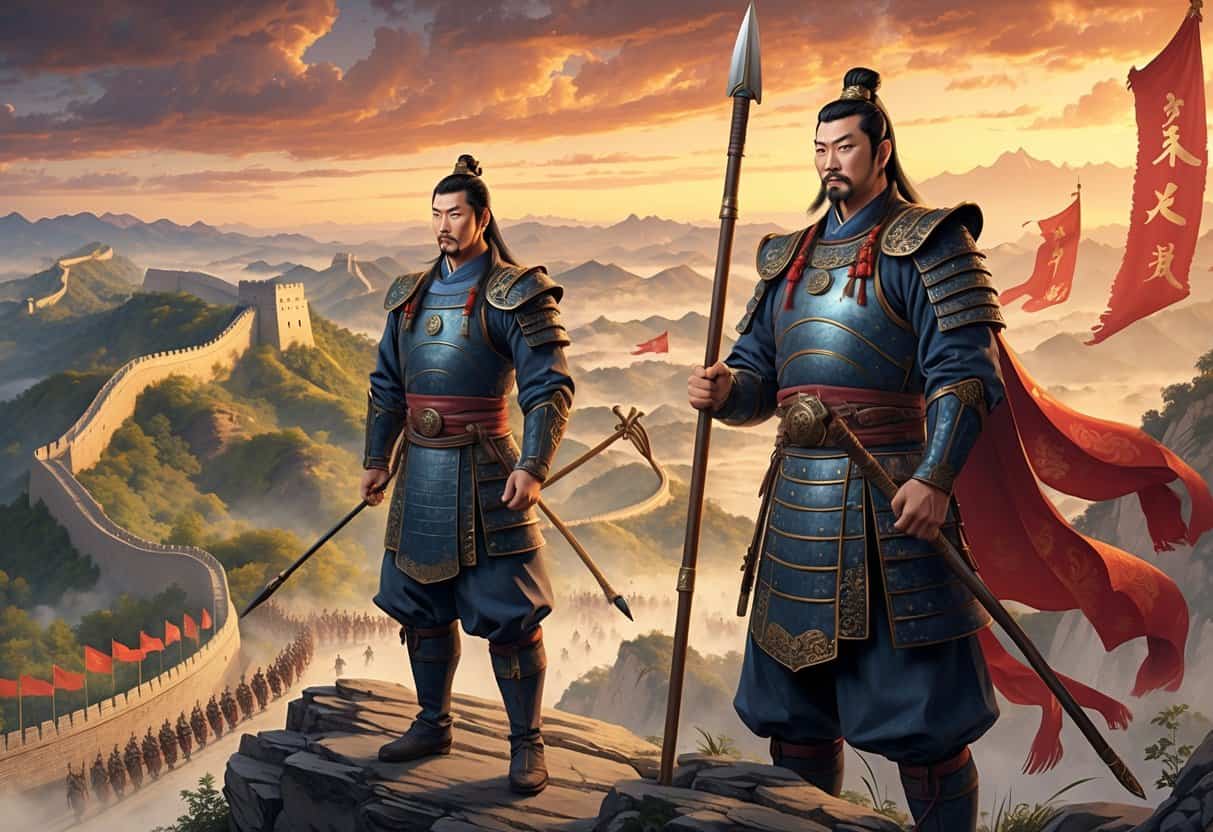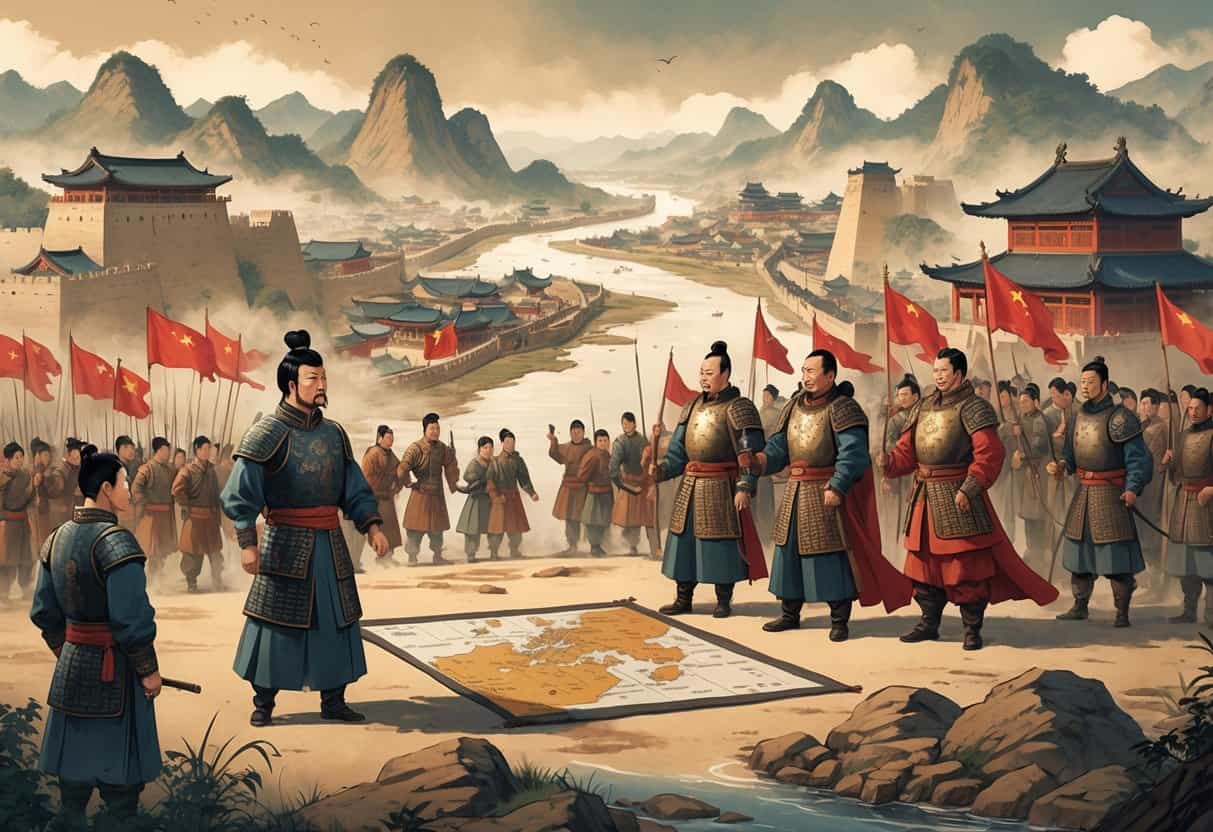Before China was a single empire under the Qin dynasty, it was just a patchwork of warring states, each hungry for power. Two generals, Wang Jian and Meng Tian, made a huge difference in putting an end to all that chaos.
Wang Jian led massive armies in critical battles, while Meng Tian secured borders and expanded territory, both shaping the future of Chinese history.

Their leadership and military skill really tipped the scales in the struggle to unify ancient China. Thanks to their work, order replaced a long stretch of turmoil, opening the door for imperial China under the first emperor.
Key Takeways
- The Warring States period was a time of constant conflict before China’s unification.
- Wang Jian was a powerful general who led major battles for Qin’s success.
- Meng Tian helped defend and expand the empire’s borders during unification.
The Historical Context: China Before Unification

Before unification, China was divided into rival states. It’s important to get a sense of how these states struggled, how the Qin dynasty rose, and how politics and armies shaped everything.
This background really sets the stage for Wang Jian and Meng Tian’s roles later on.
The Warring States Period
China back then was split into several independent states. From about 475 to 221 BCE, these states fought constantly.
The fighting was fierce, with armies trying out new tactics and weapons. Each state had its own rulers and cultures, so the differences ran deep.
With wars raging on, leaders had to build bigger, better armies. They recruited widely, so battlefields were crowded and commanders had to be sharp.
Qin Dynasty Emergence
Qin pulled ahead by sticking to strict laws and tight central control. Powerful rulers leaned on skilled commanders to stretch their influence.
Unlike the rest, Qin built a strong bureaucracy to keep its growing land in check. The armies were well-trained, well-equipped, and the state kept a close eye on families and land to fund the military.
That’s what put Qin in the best spot to conquer its rivals.
Political and Military Landscape
Politics were a mess—alliances came and went in a flash. Survival meant staying in control, and rulers needed loyal military commanders at their side.
Military tactics got a big upgrade. Armies experimented with new formations and strategies, and recruitment expanded beyond just the local villages.
That’s why armies got way bigger and more organized than before.
Wang Jian: Life, Leadership, and Contributions
Wang Jian was a major military leader who helped shape the unification of China under Qin Shihuang. His knack for strategy and commanding huge armies left a real mark on Qin’s military success.
Let’s dig into his background, his approach to war, and how he fit into the big picture.
Early Life and Rise to Power
Wang Jian lived during the tail end of the Warring States period, serving the State of Qin. We don’t know a ton about his early years, but it’s clear he rose through the ranks thanks to his skill and loyalty.
He was great at organizing troops and pulling off tricky strategies, which got the Qin rulers’ attention. By the time Qin Shihuang was in charge, Wang Jian was already a trusted general.
His climb was steady—one promotion after another, all based on results. When it came time for the wars to unite China, his leadership was crucial.
Military Tactics and Campaigns
Wang Jian’s tactics balanced careful planning with bold moves. Sometimes he led armies of over 600,000 soldiers, which is just wild.
He put a big emphasis on training and discipline, making sure orders from the top were followed to the letter. His campaigns often involved surrounding and besieging enemy states.
He wasn’t afraid to mix things up, using both land and naval units depending on what the battle called for. That kind of flexibility helped Qin take down tough opponents like Chu.
Wang Jian worked closely with deputies such as Meng Wu and Meng Tian to pull off these massive campaigns.
Role in Qin Shihuang’s Unification Efforts
Wang Jian was right at the center of Qin Shihuang’s plan to unify China. The emperor handed him imperial decrees and massive armies to take on rival states.
His victories made the empire safer and expanded its reach. Wang Jian’s leadership was part of a bigger system of strict planning and centralized command.
He was trusted to carry out complicated plans, always making sure things lined up with the emperor’s goals. That’s how he helped lay the groundwork for the first Chinese empire.
| Key Contributions | Details |
|---|---|
| Army Command | Led up to 600,000 soldiers |
| Military Training and Discipline | Emphasized strict discipline |
| Major Campaigns | Conquest of Chu and other states |
| Collaboration | Worked with generals like Meng Tian |
Meng Tian: Achievements and Strategic Legacy
Meng Tian played a big part not just in battles, but also in building projects that locked in Qin’s power. His story includes family roots, new tactics, and—maybe most famously—his work on the Great Wall.
Let’s take a look at what made him stand out.
Family Background and Appointment
Meng Tian came from a family of soldiers—his father also served Qin. That gave him a head start with military command.
Because of his skill and loyalty, Qin Shihuangdi trusted him with leading major campaigns. His appointment wasn’t just about family; he’d proven himself.
With that trust, Meng Tian could organize big armies and handle tough defense jobs near places like Beijing and the Yalu River.
Contributions to Military Innovation
Meng Tian improved how the army trained and planned. He figured out better ways to control big forces and coordinate troop movements.
His changes made the defenses along the northern border stronger. For example, he set up systems so the Qin army could react fast to threats like Xiongnu raids.
By tightening up organization and discipline, Meng Tian helped keep the empire’s rule solid.
Supervision of the Great Wall Construction
Meng Tian oversaw the building of the first real stretches of the Great Wall. This was more than just stacking stones—it was about keeping out invaders by linking up older walls and forts.
He had to organize troops and laborers, keep supplies moving, and make sure the wall was in the right place. The section near Beijing was part of this whole defense setup.
His job blended military command with engineering, leaving a legacy that’s still famous today.
Campaigns Along the Northern Frontier
Meng Tian led campaigns against the Xiongnu and other nomads threatening Qin’s northern border. He pushed these groups past the Yalu River, securing the frontier.
His command meant moving big armies over tough terrain, coordinating defense, and striking when needed. These actions kept the Qin state safe and stable.
Meng Tian’s legacy is really about how his military work held the empire together, especially in the most vulnerable spots.
Impact and Lasting Influence on Imperial China
Wang Jian and Meng Tian helped shape China’s empire by building strong military and government systems. What they did set standards in administration, war, and control that stuck around for centuries.
Institutional Reforms and Standards
A lot of the basics of Chinese government go back to reforms from the Qin era. Wang Jian and Meng Tian helped enforce things like uniform weights and measures.
That made trade and taxes a lot more straightforward. They also supported the creation of written inscriptions and records, which pulled more control to the center and improved how people communicated.
The Qin legal code left a mark on how laws were written for a long time. Later dynasties like the Han, Tang, and Song borrowed these standards to keep things running smoothly.
Having uniform systems made it easier to handle disasters like famine and floods, because resources could be managed better.
Military Organization and Administration
Wang Jian led huge armies with a strict command structure. Meng Tian focused on defending the borders and building infrastructure.
They organized the army into clear units with solid leadership, which meant discipline was strong. Meng Tian’s work on the early Great Wall showed how defense and offense could work together.
Their methods influenced both the navy and army in later dynasties. Having a strict chain of command was key for controlling big territories.
This kind of system helped prevent chaos when emergencies—like invasions or natural disasters—hit.
Influence on Successive Dynasties
Wang Jian and Meng Tian’s impact didn’t just end with their lifetimes. Their influence threads through the history of imperial China, popping up in ways you might not expect.
The Han dynasty, for example, took Qin military and administrative systems and pushed them even further. Later on, both the Ming and Yuan dynasties borrowed from these early reforms to help wrangle their sprawling empires.
Confucianism rose in influence under later dynasties and worked hand in hand with these systems to encourage social order. Still, if you look closely, the backbone of strong central control traces back to those military commanders and the changes they pushed through.